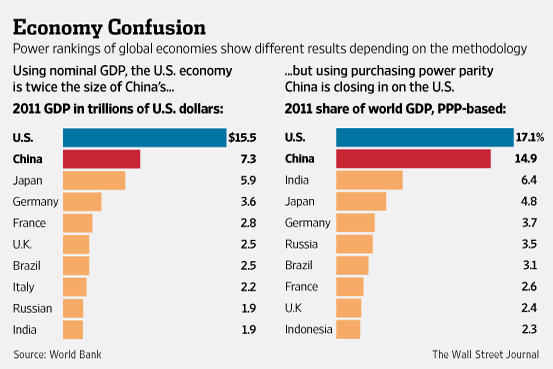According to an updated report from the World Bank’s International Comparison Program, China is set to overtake the U.S. as the world’s largest economy in terms of purchasing-power parity (PPP)-adjusted GDP before the closing of 2014. Comparing the ICP’s new data to standing IMF projections, The Economist concurs that China will indeed be the largest economy on the planet by the year’s end:
UNTIL 1890 China was the world’s largest economy, before America surpassed it. By the end of 2014 China is on track to reclaim its crown. Comparing economic output is tricky: exchange rates get in the way. Simply converting GDP from renminbi to dollars at market rates may not reflect the true cost of living. Bread and beer may be cheaper in one country than another, for example. To account for these differences, economists make adjustments based on a comparable basket of goods and services across the globe, so-called purchasing-power parity (PPP). New data released on April 30th from the International Comparison Programme, a part of the UN, calculated the cost of living in 199 countries in 2011. On this basis, China’s PPP exchange rate is now higher than economists had previously estimated using data from the previous survey in 2005: a whopping 20% higher. So China, which had been forecast to overtake America in 2019 by the IMF, will be crowned the world’s pre-eminent country by the end of this year according to The Economist’s calculations. The American Century ends, and the Pacific Century begins. [Source]
Click through to see this estimation visualized in The Economist’s accompanying chart.
Not everyone is as confident about the accuracy of the PPP-based projections that are now informing many headlines:
Test of whether people know anything about China: if they tout new PPP figures making China “biggest” economy, they don’t.
— James Fallows (@JamesFallows) April 30, 2014
On China “passing” US — interestingly, because of fall in RMB this year, in exchange rate terms China may FALL FURTHER BEHIND U.S. in 2014
— Mike Forsythe 傅才德 (@PekingMike) April 30, 2014
At the Wall Street Journal, Tom Wright describes the PPP-based methodology in detail, explaining that while it’s used by economists to “get at the hidden advantages developing nations have,” it comes with many limitations:
PPP is useful as a way to get at hidden advantages developing nations have. For instance, it costs the Chinese government much less to pay its soldiers than it does the U.S. government to pay GIs. Tourists from rich countries intuitively reflect on PPP when they visit poor ones and buy dinner, thinking, “Geez, my dollar goes farther here.”
[…] But the concept has steep limitations too. China can’t buy missiles and ships and Iphones and German cars in PPP currency. They have to pay at prevailing exchange rates. That’s why exchange rate valuations are seen as more important when comparing the power of nations.
Like all data, though, there are reasons to treat PPP-based calculations with caution. For one, they are a statistical construction, based on complex surveys of baskets of goods in many countries. The IMF points out here the possible statistical errors. And the ICP notes in Wednesday’s release there’s a margin of error either way of 15% when using its data to compare economies of different sizes.
[…] Ranking the ICP numbers on a per capita basis, China comes in 99th position. India is at No. 127. The U.S. places 12th, a reflection of its much higher productivity and relative wealth. [Source]
The ICP’s updated report, which the Financial Times notes shows “the new methodology as well as faster growth in poor countries ha[s] ‘greatly reduced’ the gap between rich and poor, ‘suggesting that the world has become more equal,'” comes just after a recent study showed that income inequality in China has surpassed that of the U.S.








